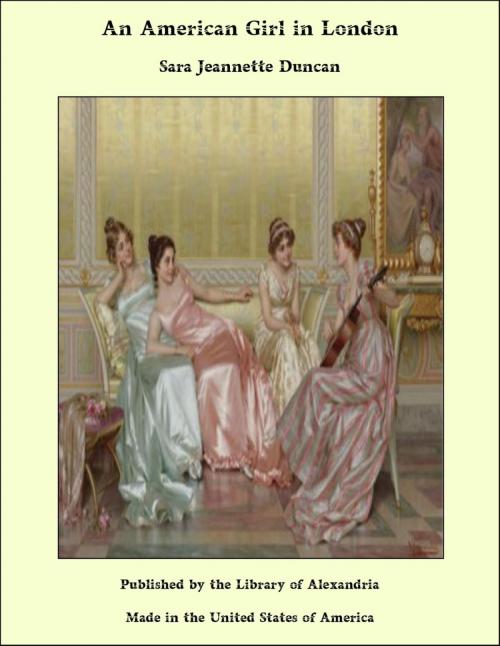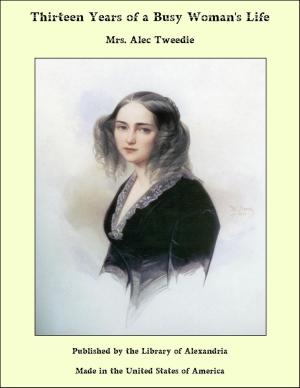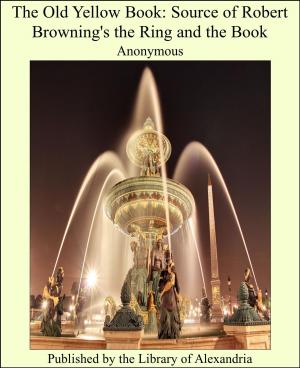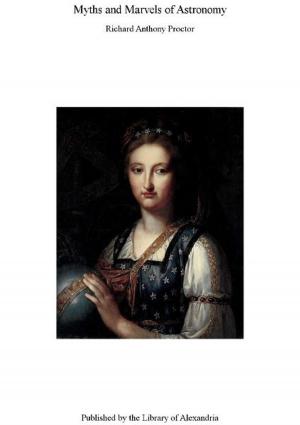An American Girl in London
Nonfiction, Religion & Spirituality, New Age, History, Fiction & Literature| Author: | Sara Jeannette Duncan | ISBN: | 9781465618733 |
| Publisher: | Library of Alexandria | Publication: | March 8, 2015 |
| Imprint: | Language: | English |
| Author: | Sara Jeannette Duncan |
| ISBN: | 9781465618733 |
| Publisher: | Library of Alexandria |
| Publication: | March 8, 2015 |
| Imprint: | |
| Language: | English |
I AM an American Girl. Therefore, perhaps, you will not be surprised at anything further I may have to say for myself. I have observed, since I came to England, that this statement, made by a third person in connection with any question of my own conduct, is always broadly explanatory. And as my own conduct will naturally enter more or less into this volume, I may as well make it in the beginning, to save complications. It may be necessary at this point to explain further. I know that in England an unmarried person, of my age, is not expected to talk much, especially about herself. This was a little difficult for me to understand at first, as I have always talked a great deal, and, one might say, been encouraged to do it; but I have at length been brought to understand it, and lately I have spoken with becoming infrequency, and chiefly about the Zoo. I find the Zoo to be a subject which is almost certain to be received with approval; and in animal nature there is, fortunately, a good deal of variety. I do not intend, however, in this book, to talk about the Zoo, or anything connected with it, but about the general impressions and experiences I have received in your country; and one of my reasons for departing from approved models of discussion for young ladies and striking out, as it were, into subject-matter on my own account, is that I think you may find it more or less interesting. I have noticed that you are pleased, over here, to bestow rather more attention upon the American Girl than upon any other kind of American that we produce. You have taken the trouble to form opinions about her—I have heard quantities of them. Her behaviour and her bringing-up, her idioms and her 'accent'—above all her 'accent'—have made themes for you, and you have been good enough to discuss them—Mr. James, in your midst, correcting and modifying your impressions—with a good deal of animation, for you. I observe that she is almost the only frivolous subject that ever gets into your newspapers. I have become accustomed to meeting her there, usually at the breakfast-table, dressed in green satin and diamonds. The encounter had quite a shock of novelty for me at first, but that wore off in time; the green satin and diamonds were so invariable. Being an American girl myself, I do not, naturally, quite see the reason of this, and it is a matter I feel a delicacy about inquiring into, on personal grounds. Privately, I should think that the number of us that come over here every summer to see the Tower of London and the National Gallery, and visit Stratford-upon-Avon, to say nothing of those who marry and stay in England, would have made you familiar with the kind of young women we are long ago; and to me it is very curious that you should go on talking about us. I can't say that we object very much, because, while you criticise us considerably as a class, you are very polite to us individually, and nobody minds being criticised as a noun of multitude. But it has occurred to me that, since so much is to be said about the American Girl, it might be permissible for her to say some of it herself.
I AM an American Girl. Therefore, perhaps, you will not be surprised at anything further I may have to say for myself. I have observed, since I came to England, that this statement, made by a third person in connection with any question of my own conduct, is always broadly explanatory. And as my own conduct will naturally enter more or less into this volume, I may as well make it in the beginning, to save complications. It may be necessary at this point to explain further. I know that in England an unmarried person, of my age, is not expected to talk much, especially about herself. This was a little difficult for me to understand at first, as I have always talked a great deal, and, one might say, been encouraged to do it; but I have at length been brought to understand it, and lately I have spoken with becoming infrequency, and chiefly about the Zoo. I find the Zoo to be a subject which is almost certain to be received with approval; and in animal nature there is, fortunately, a good deal of variety. I do not intend, however, in this book, to talk about the Zoo, or anything connected with it, but about the general impressions and experiences I have received in your country; and one of my reasons for departing from approved models of discussion for young ladies and striking out, as it were, into subject-matter on my own account, is that I think you may find it more or less interesting. I have noticed that you are pleased, over here, to bestow rather more attention upon the American Girl than upon any other kind of American that we produce. You have taken the trouble to form opinions about her—I have heard quantities of them. Her behaviour and her bringing-up, her idioms and her 'accent'—above all her 'accent'—have made themes for you, and you have been good enough to discuss them—Mr. James, in your midst, correcting and modifying your impressions—with a good deal of animation, for you. I observe that she is almost the only frivolous subject that ever gets into your newspapers. I have become accustomed to meeting her there, usually at the breakfast-table, dressed in green satin and diamonds. The encounter had quite a shock of novelty for me at first, but that wore off in time; the green satin and diamonds were so invariable. Being an American girl myself, I do not, naturally, quite see the reason of this, and it is a matter I feel a delicacy about inquiring into, on personal grounds. Privately, I should think that the number of us that come over here every summer to see the Tower of London and the National Gallery, and visit Stratford-upon-Avon, to say nothing of those who marry and stay in England, would have made you familiar with the kind of young women we are long ago; and to me it is very curious that you should go on talking about us. I can't say that we object very much, because, while you criticise us considerably as a class, you are very polite to us individually, and nobody minds being criticised as a noun of multitude. But it has occurred to me that, since so much is to be said about the American Girl, it might be permissible for her to say some of it herself.















